WHICH RECIPE DO YOU LIKE BEST?
SEND US AN EMAIL OR VOTE ON OUR FACEBOOK PAGE TO « LIKE » YOUR FAVORITE RECIPE
RECIPES FROM 2020-2021 STUDENTS :
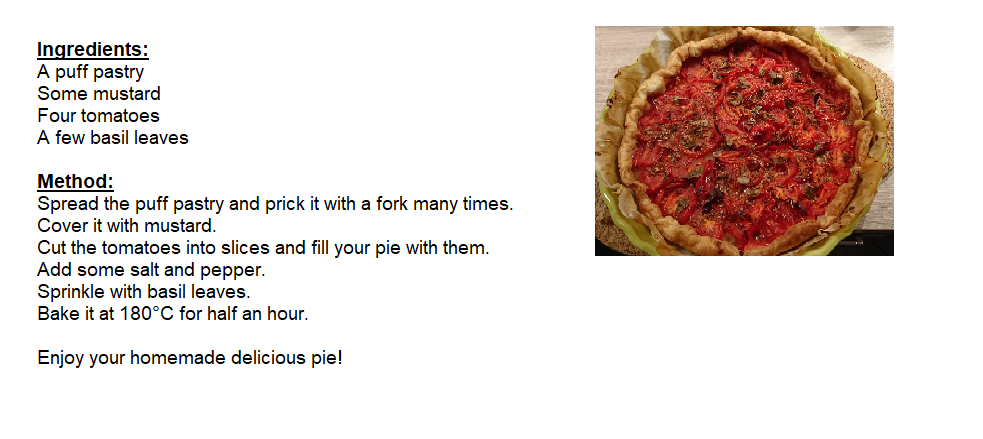
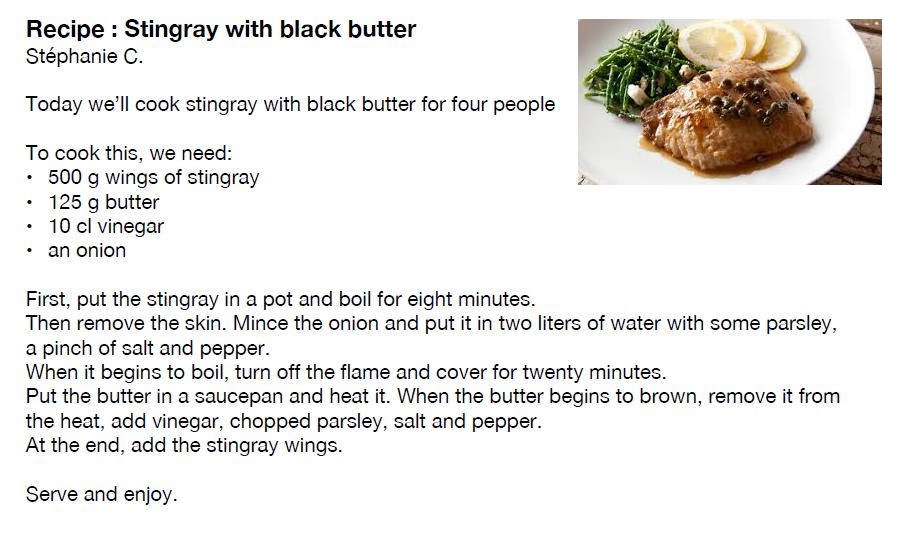
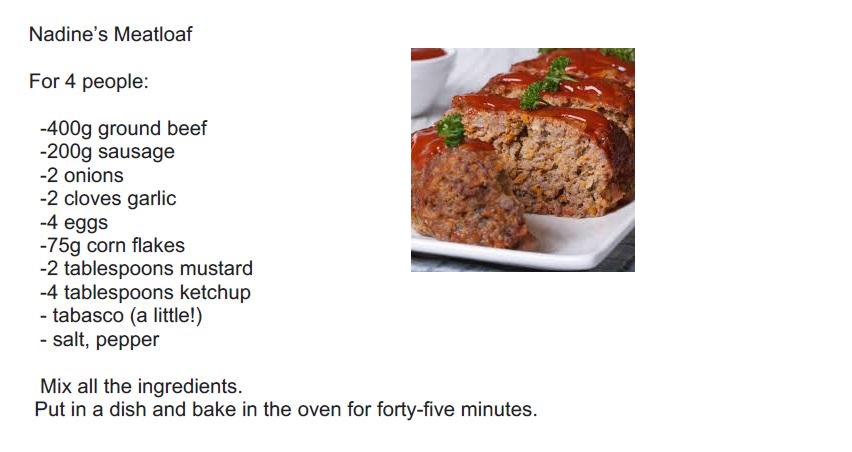
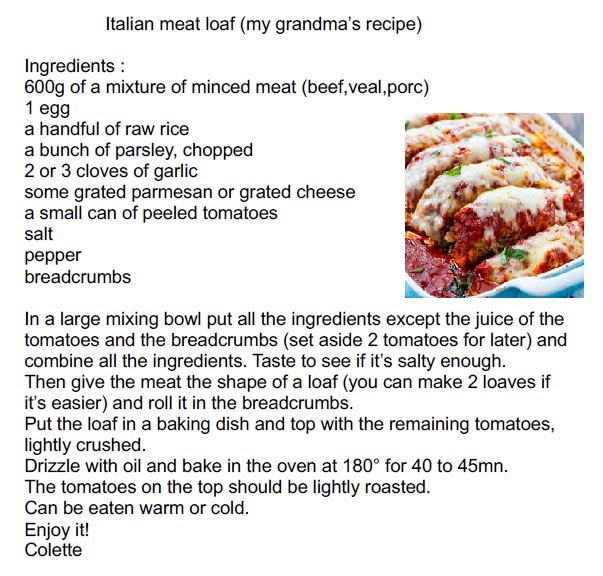
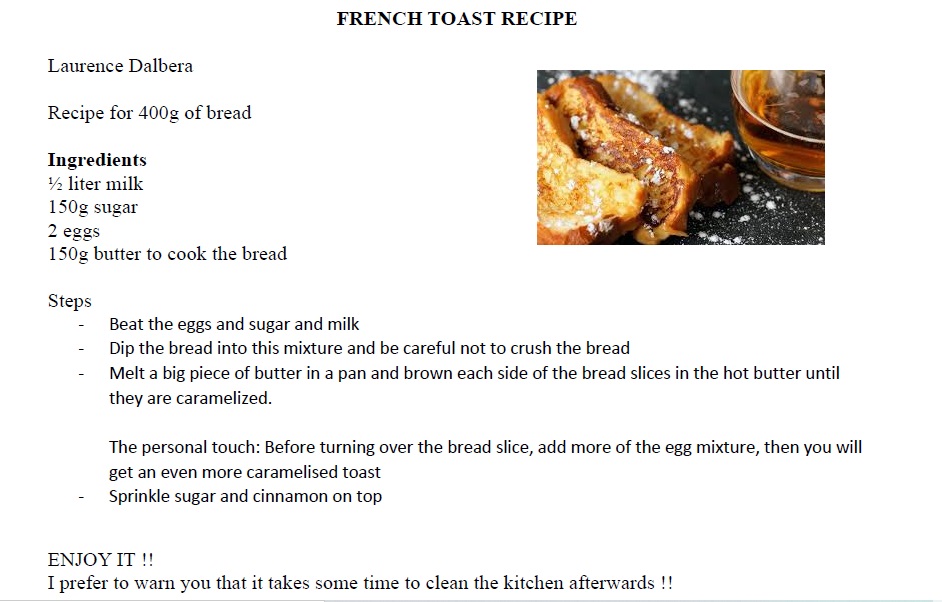
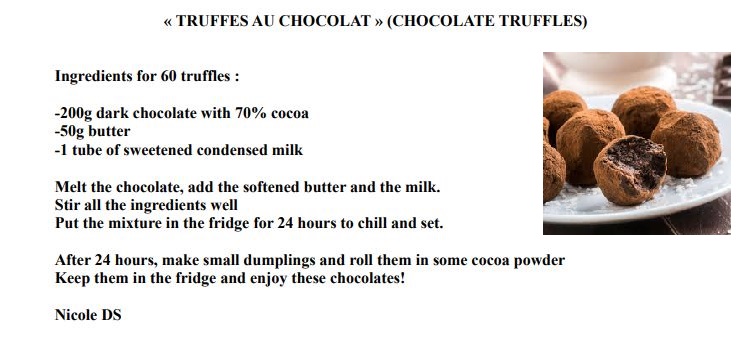
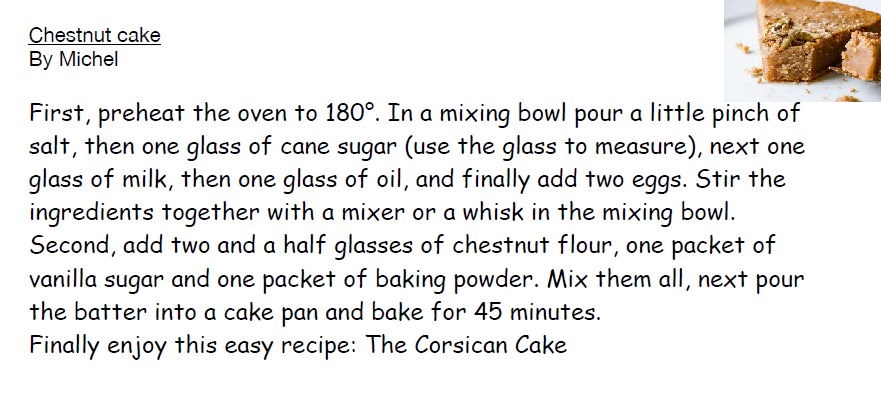
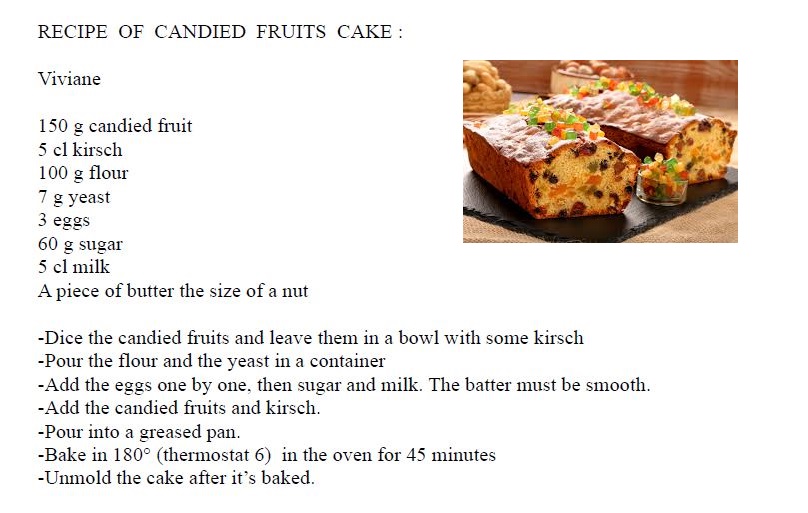
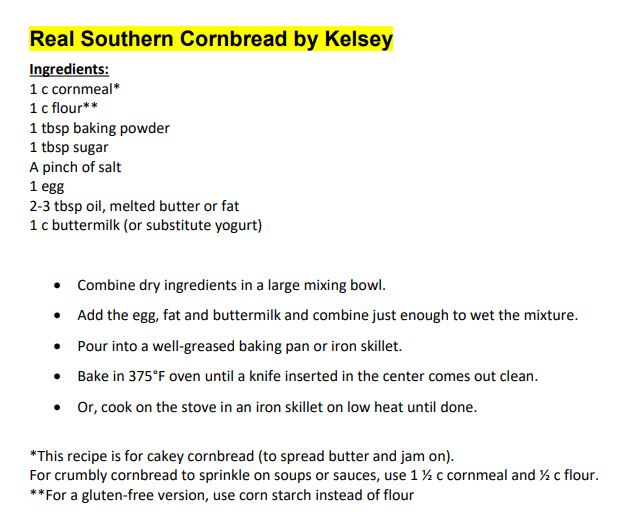
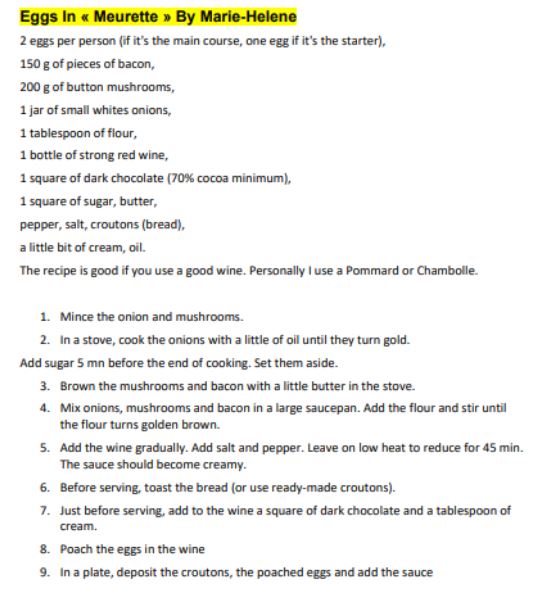
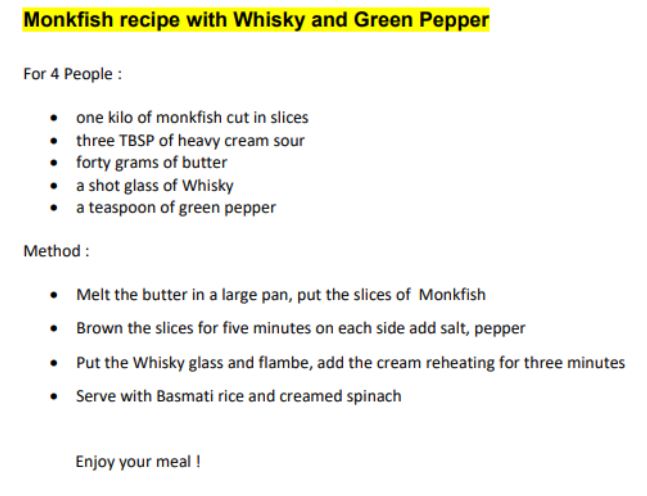
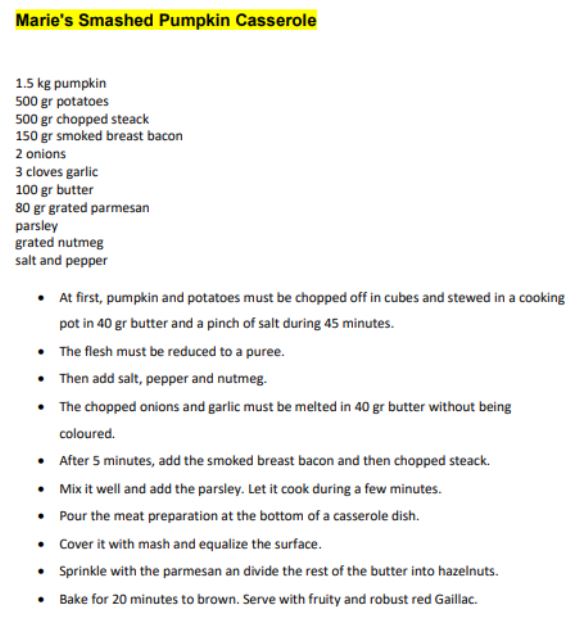
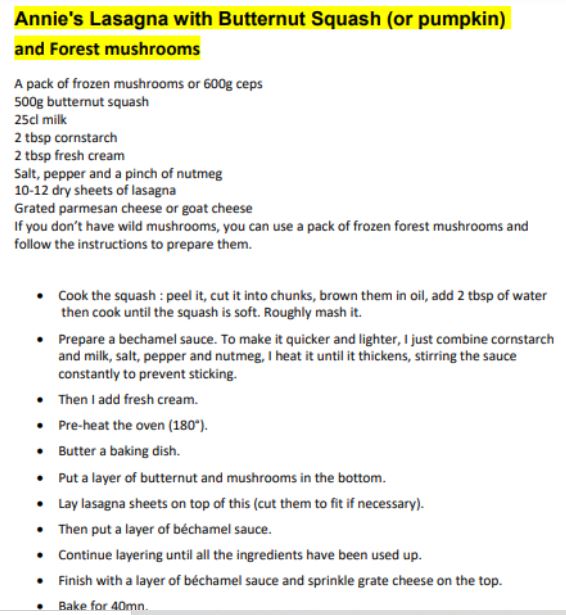
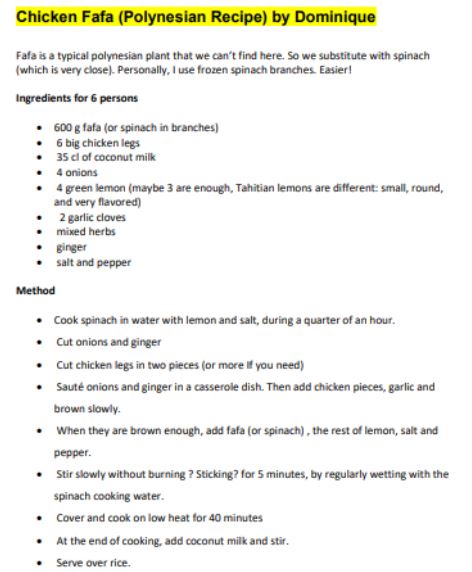
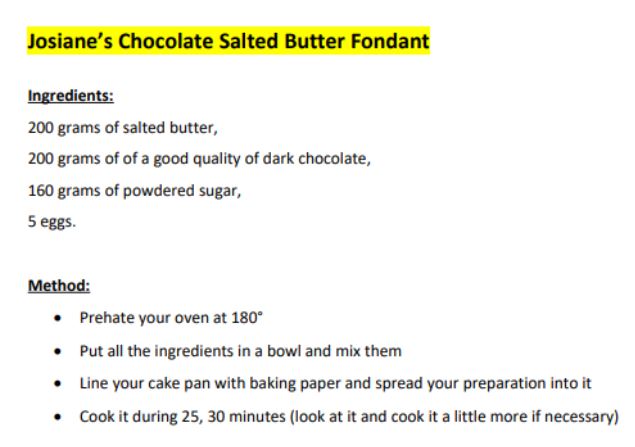
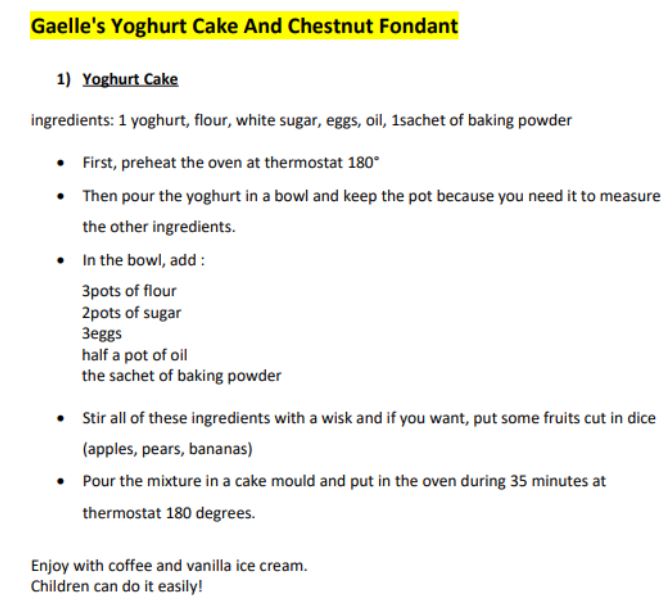
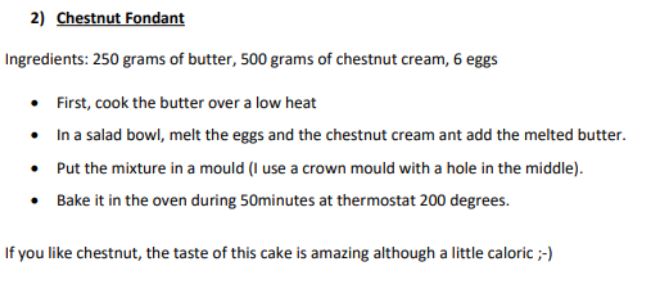
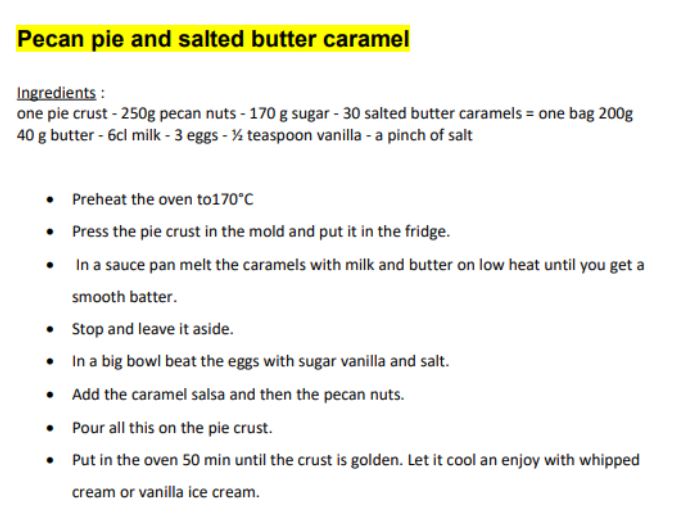
All the recipes in this PDF file :


















All the recipes in this PDF file :
Chat: How was your spring break? What did you do?
Warm-up question:
Which would you rather be and why?
Watch video:
https://learnenglishteens.britishcouncil.org/study-break/video-zone/one-day-i-will-lagos
Listen to the video a third time. How do the people in the video shorten these expressions?
Other expressions for talking about goals and dreams:
WEEK 1: Past continuous review and DETECTIVES game
WEEK4 : Past Continuous introduction and games
WEEK3 : Listen to Aisling’s answers
Aisling’s answers part1
Ireland research (Cliffs of Moher, Trinity College, Bacon and Cabbage, Dermot Kennedy…)
WEEK2 : Video questions for Aisling
– Describing an image
WEEK1 : Ireland / Saint Patrick’s Day quiz and fact sheet.
– Reading comprehension skills: identifying key words and using context clues to understand a text.
– Learn about Irish dance and practice some steps: https://www.youtube.com/watch?v=595AKDailds
WEEK4: School holidays
WEEK3 : Games before the holidays
– Relative clauses with « that », « which », « who », « where »
– Taboo game using relative clauses
WEEK2 : American / British culture
– Quiz book. Choose a quiz topic and do the quiz together.
– Create a quiz about your home!
– Check quiz questions for correct question construction.
WEEK1 : Warm-up: Show drawing of a groundhog and discuss
« Groundhog Day » and French and American cultural difference.
Questions format: Question word – Auxiliary – Subject – Verb
Game: « One minute challenge »: write topics on the board. Throw a paper ball at the board to choose a topic. In groups, speak for one minute about the topic. Each group member should ask one follow-up question (using the correct question word and structure).
Guess Who or Story Cubes
Extra links to learn more about Groundhog Day:
Short history of the tradition: https://dltk-kids.com/crafts/happy_groundhog-history.htm
News Report: Groundhog Day 2021:
WEEK4 : Daily life of an American Teenager
Warm-up: A-Z board race game. Topic: things you can find in a school
Video: « Daily life of an American Teenager » https://www.youtube.com/watch?v=B8QwKTGLlyw
Discussion: what are the similarities and differences between the American teenager’s routine and yours? Are there any aspects of American life that you prefer? Is there anything in the video that you find weird or funny? Basketball review game.
WEEK3 : What do you really know about the USA?
Warm-up: Name the country represented by each flag.
Introduce « English-speaking countries » video project.
Learn some names and flags of English-speaking countries.
« Concentration » review game for country names and a few bonus categories.
American culture quiz in teams.
WEEK1 : Celebrating the New Year: US vs France
– Video: « Resolutions! » (American teenagers):
https://www.youtube.com/watch?v=aj_hqugXDH4 (first minute)
– Understanding spoken English: gonna, wanna, gotta.
Here is a link for extra practice: https://www.tolearnenglish.com/exercises/exercise-english-2/exercise-english-103131.php
Videos / Texts: Giant Chocolate Chip Cookie Recipe
https://learnenglishteens.britishcouncil.org/study-break/video-zone/giant-chocolate-chip-cookie
World’s weirdest food
Games / Activities: Board game, Logic puzzle, Tongue-twisters, captions contest, make a pizza contest
Language focus: cooking verbs; food vocab; descriptive adjectives + making adjectives from other parts of speech; countable vs uncountable nouns
Videos / Texts: Secret Santa video; “All I want for Christmas is you”
Games / Activities: “Categories” game; advent calendar; Christmas quiz; “all I want for Christmas is you” gap fill
Mariah Carey lyric video :
Language Focus:
Christmas / holiday vocabulary;
adjectives ending in -ed vs -ing;
talking about plans with BE + V-ing
WEEK2: Christmas Personality Quiz for Teens
– « Which of Santa’s reindeer are you ? » https://www.beano.com/posts/personality-quiz-which-reindeer-are-you
– « Have you been naughty or nice this year? » https://www.beano.com/posts/naughty-or-nice-christmas-quiz
Choice of Christmas song gap fill: « All I want for Christmas is you » by Mariah Carey and Justin Bieber or « White Christmas » by Lady Gaga
Grammar point: « May » for a wish vs possibility or permission.
In the video below, helping verbs = modal verbs = LES VERBES MODAUX en français 😉
More resources:
Christmas songs, lyrics and exercises:
https://www.esolcourses.com/topics/christmas-songs.html
Christmas quizzes, games and jokes :
New words and phrases :
« How’s the weather » song and dance.
Special Activity: Outdoor Treasure Hunt
Rain, rain, go away song
Introduce « family » vocabulary : Family, daddy, mommy, brother, sister, baby.
What’s his name? What’s her name? His name is / Her name is.
Craft/activities for Mother’s Day
Begin Mother’s Day Flower Craft: https://www.tts-group.co.uk/blog/2020/03/07/mothers-day-egg-box-flowers-craft.html
« Baby Shark » song and dance to review family vocabulary and counting
Father’s Day
WEEK 1: Prepositions song and Easter egg hunt
WEEK 4:
– Finish Easter Bunny book
– Prepositions song :
– « Easter Eggs ».
o It’s got… stripes / spots / stars / hearts / zigzags
WEEK3 : POPSICLE STICK LEPRECHAUN
– Begin Easter Bunny book
– Vocabulary: rabbit, easter bunny, egg, chick, Easter, hop, wiggle your ears, wiggle your tail
– « Bunny, Bunny, Chick » game
WEEK2 :
– Popsicle stick leprechaun (craft)
– « I’m a little leprechaun » song
Review vocab from before the holiday.
– « I’m a little leprechaun » song
– Saint Patrick’s Day treasure hunt activity
– Saint Patrick’s Day coloring activity.
– Begin « prepositions of position » : UNDER, ON, IN, BEHIND, IN FRONT OF, BETWEEN
WEEK 1 : School holidays
WEEK4 : School holidays
WEEK3 : Rooms of the house vocabulary (3)
– Vocabulary review games
– Rooms of the house game. « in » for location.
o Where’s the ____ ? Is it in the _____ ? Yes it is. No it isn’t.
WEEK2 : Rooms of the house vocabulary (2)
– Rooms of the house song,
– Flashcard games
– New words: window, door, chimney, garden, hall
– Drawing activity. Draw a house. Is it big or small? What color is it? How many windows / doors does it have? Does it have a bedroom, bathroom, etc. ?
WEEK1 : Rooms of the house vocabulary
House ; Apartment ; Bedroom ; Bathroom ; Living Room ; Dining Room ; Kitchen ; Hall ; Garden ;
« The House Song »:
Flashcard games
Draw or make a play-doh house
WEEK4 – in person :
« Freeze Dance » song; Winter clothes song ;
Review games for winter and Three Little Kittens vocabulary
Make a cardboard kitten. Use stickers for eyes, nose and buttons. With a marker, draw some whiskers, a mouth, some boots and a hat. Use yarn or a fuzzy pipe cleaner to make a scarf.
WEEK3 – in person :
« winter clothes » vocabulary review games: Simon Says, Memory
Video: « Three little kittens »https://www.youtube.com/watch?v=k6X2wJ6L0SY
Craft: Colorful paper mittens
WEEK2 – in person : Review numbers, colors, 4 seasons + Winter clothes vocabulary
– Winter clothes song (with « Head shoulder knees and toes » rythm »)
– Winter clothes vocabulary games : hat, coat, pants, boots, sweater, scarf, socks, gloves
– Peppa pig « snow » episode: https://www.youtube.com/watch?v=RbKPdwBOPF8
– Peppa pig and snowman coloring activity
WEEK1 : Four seasons : Spring, Summer, Fall, Winter
« I’m a little snowman » song: https://www.youtube.com/watch?v=FczqntFwb6k
Draw a snowman. Give him… a hat, three buttons, a scarf, two eyes, a nose, a mouth- Dress for the season game: https://www.pbslearningmedia.org/resource/evscps.sci.ess.watcyc.dress/dress-for-the-weather/#.X_texC9TrUo
Songs: « Broccoli Yogurt » and « Let’s make a pizza »
Book: Turkey Trouble by Wendi Silvano
Here it is read out loud on youtube: https://www.youtube.com/watch?v=AjXTNlW2qaU
Crafts/Activities: Invent a crazy food combination like in the song “broccoli yogurt”. Draw a pizza with your favorite toppings. Thanksgiving turkey craft:
New Language:
Food items vocabulary: broccoli, ice cream, soup, pizza, popcorn, bananas, tomatoes, cheese, mushrooms…
Do you like…?
Yes I do / No I don’t
I like… / I love… / I don’t like…
It’s yummy! / It’s yucky! / It’s delicious!
Happy Thanksgiving!
Farm animals: Turkey, horse, cow, pig, sheep, rooster
Songs: “Santa’s on his way” and “We wish you a merry Christmas”
Book: « A letter to Santa » by Janet Palazzo-Craig
Draw and decorate a Christmas stocking. Is there a surprise inside?
Vocabulary : stocking, Christmas tree, Santa, reindeer, present, surprise, snowman. Merry Christmas! Happy New Year!
Crafts/activities: Letter to Santa; Christmas Crackers
SOME BEAUTIFUL CHRISTMAS STORIES FOR KIDS :
IF :
NO WORRIES, EVERYTHING IS HERE, IN THE REPOSITORY 2020 :
YOUNG KIDS (4/6 YEARS OLD) : https://www.by-the-way.fr/young-kids-repository-2020/
KIDS (7/10 YEARS OLD) : https://www.by-the-way.fr/kids-repository-2020/
TEENS : https://www.by-the-way.fr/teens-repository-2020/
ADULTS – BEGINNERS : https://www.by-the-way.fr/repository-2020/
ADULTS – INTERMEDIATE : https://www.by-the-way.fr/repository-2020-2/
ADULTS – ADVANCED : https://www.by-the-way.fr/advanced-repository-2020/
WEEK1/ WEEK2 : PHRASAL VERBS QUIZZ OR TALK & WALK
Phrasal-verb-quizWEEK3: Using « Get » as a main verb
All about « get » as a main verb…
1. You know about the causative constructions:
« to get someone to do something »
« To get something done »
2. GET + adjective = to become (can be used for the French « reflexive » or « reciprocal » forms)
They got married last week.
It gets colder in the evenings so don’t forget your coat.
He got hurt on the job but the company refused to compensate him.
3. GET + noun = to obtain (buy, take, receive…)
If you’re stopping at the grocery store, could you get some milk?
The summer road trip was going great… until we ran over a nail and got a flat tire.
4. To understand:
I get it!
Well, you get the idea.
Got it?
I don’t get it.
5. GET (to) + a place = to arrive
When do you think you’ll get here?
They got to the shop too late; it was already closed.
6. GET TO + V = be able to
I can’t believe we got to see the Rolling Stones!
Since the hotel accidentally double-booked their room, they got to upgrade to a luxury suite for free.
7. HAVE GOT TO + V = must (often shorted to « gotta »)
You’ve got to listen to me, it’s important!
Sorry, gotta go!
Homework: write a sentence for each use of « get » as a main verb (we can review the ones you are not sure about next time).
HOMEWORK : PHRASAL VERB QUIZZ AFTER THE HOLIDAYS
THE-20-MOST-COMMON-PHRASAL-VERBSWEEK2 : Discussion and vocabulary review about TRAVELLING
Discussion
Les réponses :
WEEK1 : Present perfect review and « I have never » travel discussion game to practice the present perfect.
WEEK4 : Discussion using travel expressions from last week. Watch « Venice » travel video. Past perfect uses review.
Travel expressions:
Get the travel bug
At the crack of dawn
Travel light
Watch your back
Culture shock
Feel right at home
Travel on a shoe string
Catch some rays
Culture vulture
Live it up
Get itchy feet
Sit and watch the world go by
Homework: match the expression to its definition + phrasal verb (« turn out » or « run out of » depending on the group)
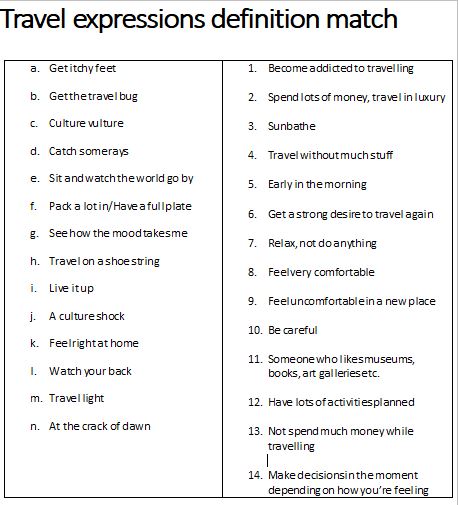
WEEK3 : Grammar point PRESENT PERFECT SIMPLE vs PRESENT PERFECT CONTINUOUS
Explanation and 3 pages of exercises https://test-english.com/grammar-points/b1/present-perfect-simple-present-perfect-continuous/
Extra practice: https://www.perfect-english-grammar.com/present-perfect-present-perfect-continuous-2.html
WEEK2 : TALK & WALK (Monday class)
OR Discussion about your dream house and everyday life
Weird accommodations and « amenities »: Have you ever stayed in unique or odd accommodations? Which amenities are essential when you are traveling? Which ones can you go without?
Example of weird accommodations: the Idaho Potato Hotel
Grammar point – Clefts sentences : What I really want is… / It is a …. I dream about / All I want (for Christmas) is (you)…
Link to grammar explanation: https://tefl-planet.com/2017/03/28/how-to-teach-cleft-sentences-3/
Wednesday 6:30PM Homework: Exercise 1 at this link: https://test-english.com/grammar-points/b2/cleft-sentences/
We will « put off » talking about the verb « to find out » until next week 😉
Friday 12:30PM homework: You are planning a holiday. You want to book accommodations. Which amenities are essential for you? Use cleft sentences.
Phrasal verb: to pick up
-> to go and get something / someone
-> to learn something
ex : I never pick up hitchhikers
WEEK1 : Holiday break
WEEK4 : Holiday break
WEEK3 : Review « causative » construction.
« Reading Houses » text: https://www.teachingenglish.org.uk/sites/teacheng/files/Reading%20house%20student%20worksheet.pdf
Which features of a house are essential, in your opinion? Which are not essential?
Homework: Describe your dream home OR research and describe an unusual home.
WEEK2 : New topic: House and Home.
Go over « modal verbs of deduction » homework.
Discussion: Super Bowl
– Expressions with « house » and « home »
– What does « home » mean to you?
– Jason Momoa Super Bowl Commercial :
Grammar point: Causative constructions: « to have something done » or « to get something done ». « Home improvement » text with exercises.
Homework: Phrasal Verb « to put off » / « to find out »
and depending on your group… watch the Mr. Bean video and give advice using the « causative construction » OR tell about a time when you made home improvements.
https://www.youtube.com/watch?v=M5rkQLXH9p4
WEEK1 : For groups who did a « TALK AND WALK » this month: January Week 4 Lesson.
!!!Extra conditional exercises!!!
– https://www.perfect-english-grammar.com/first-second-third-conditionals-exercise.html
**Wednesday evening group**:
Modal verbs of deduction:
– Must be / has to be / has got to be
– Might be / may be / could be
– Can’t be
Text: « The elixir of life »
https://www.esljokes.net/ui6.html
Practice: Real or fake news headlines quiz
https://www.theguardian.com/newswise/2020/mar/20/the-newswise-fake-or-real-headlines-quiz
Homework: phrasal verb « to look after »
+ Exercises accompanying the text (link to answers at the bottom of the webpage): https://www.esljokes.net/ui6.html
WEEK4 : TALK AND WALK Or 6-Minute English: The Science of Loneliness
https://www.bbc.co.uk/learningenglish/features/6-minute-english/ep-201126
Listen to the recording and read along with the transcript. Can you give some examples of « pinch points »? How do you cope with pinch points when they happen? What is the difference between solitude and loneliness, according to the researcher? Do you agree with her claim? In the video, they mentioned Mauro Morandi. His boat broke down on an island and he decided to stay there–alone–for 31 years. If it had happened to you, what would you have done?
Mini- grammar review: 3rd conditionalHomework: Phrasal verb: to make upOptional: extra link for 3rd conditional practice: https://agendaweb.org/verbs/conditional-third-exercises.html
EXTRA LINKS: BBC’s Grammar Guides (we’ll do mini-lessons from the Upper-Intermediate and Advanced lists. Don’t hesitate to request explanations or exercises for a specific point)Advanced list: https://www.bbc.co.uk/learningenglish/advanced-grammar-guideUpper-Intermediate list: https://www.bbc.co.uk/learningenglish/upper-intermediate-grammar-guide
WEEK3 : We took a break from the topic to talk about the American presidential inauguration on 20 January.
Full inauguration video: https://www.youtube.com/watch?v=B6Yg6bwllM4&t=1848s(you can click on the links under the video to skip to the part you want to watch)
Youth Poet Laureate Amanda Gorman’s performance of her original poem, « The Hill We Climb » (with subtitles): https://www.youtube.com/watch?v=7jng1xuz2-I
Transcript of the poem: https://edition.cnn.com/2021/01/20/politics/amanda-gorman-inaugural-poem-transcript/index.html
Phrasal verb: « to look forward to »
Grammatical context: look forward to + N or V-ing
Communicative context: – this phrasal verb is often used at the end of formal letters or emails as a polite way of asking for a reply or arranging further communication. For example: I look forward to hearing from you soon.- it is also used in spoken communication and informal writing. In that case, we often use the continuous form of the verb. For example:Mark: « See you at lunch tomorrow? »Cathy: « Looking forward to it! »
Homework:
– Write a sentence with the following phrasal verb: to make up
– Listen to the 6 minute English recording at this link: https://www.bbc.co.uk/learningenglish/features/6-minute-english/ep-201126 We’ll discuss it next week!
WEEK2 : Video: Forest Bathing
https://healingforest.org
Discuss: What is forest bathing and where does it come from? What problems does it address? What are its benefits? How do you stay connected with nature?
Our New Year’s resolution: Learn a phrasal verb each week.
Phrasal verb list: https://intercambioidiomasonline.com/wp-content/uploads/2018/12/THE-20-MOST-COMMON-PHRASAL-VERBS-1.pdf
Homework:
– Phrasal verb « to come up with ». Write a sentence.
– What are the claims about forest bathing? Do you agree with them or are you skeptical?
If you want to learn more about forest bathing, you can consult the following web page: https://healingforest.org/2020/01/27/forest-bathing-guide/
Also, check out this article from TIME Magazine:
https://time.com/5259602/japanese-forest-bathing/
WEEK1 : BREXIT
BREXIT video
https://www.youtube.com/watch?v=TOX3SCsJ0Ew
The video is a news report from January 1st, 2021.
It shows different people’s reactions to the end of the Brexit transition period.
Watch the video:
Who reacted positively to the change? Who reacted negatively?
Useful vocabulary from the video:
– a new dawn = a new beginning
« It’s a new dawn: a new era on our relationship with the EU. »
– to dance around a topic = to avoid speaking about something
« In his New Year’s address, the Prime Minister danced around Brexit. »
– in drips and draps = little by little, in small amounts
« New details are emerging in drips and drabs. »
– to swap = to trade, to exchange
« UK and European firms can continue trades and swaps. »
– the eleventh hour = the last possible moment
« The governments reached an agreement at the eleventh hour. »
Homework : What are your New Year’s Resolutions? Make a list.
WEEK 1: A Christmas Memory by Truman Capote. Document + Video (first 5 minutes): https://www.youtube.com/watch?v=G0vjTfVyZco
WEEK2: A Christmas Memory by Truman Capote.
Homework : Ask questions about any difficult point in the text.
Continue discussion of « A Christmas Memory » by Truman Capote. At its heart, this is a story of childhood friendship. Talk about a friend you had as a child.
Read dialogue aloud on page 4-5 (Buddy and his cousin go to Mr. Haha Jones’s shop).
Practice word stress for emphasis: the words in italics in this dialogue should be longer, louder and higher-pitched.
Christmas song: « White Christmas » by Lady Gaga.
Homework: What is your favorite Christmas song? Suggest a song or carol for next week.
More resources:
Christmas songs, lyrics and exercises :
https://www.esolcourses.com/topics/christmas-songs.html
WEEK 1: Two perspectives on Thanksgiving
WEEK 2: Food vocabulary – comparing US and UK vocab. Homework – bring a recipe to share.
WEEK 3: Share recipes. Correct and send by email.
WEEK 4: “From Blossoms” poem. https://poets.org/lesson-plan/teach-poem-blossoms-li-young-lee
Pronunciation practice.
WEEK1 : Solving a crime in the airport. Role play to practice « Past Continuous ».
WEEK4 :
Wednesday: Prepositions of movement review.
ED pronunciation. Introduction to « past continuous »
Thursday: Spoken expressions part 1
Introduction to « past continuous »
Homework: Tell about something surprising that happened while you were traveling. What were you doing when it happened? Use the past continuous.
Useful spoken English phrases for intermediate learners:
Gap-Fillers
Filler words have many functions in conversation:
80 English phrases with pronunciation: https://www.englishteacheradriana.com/80-common-english-phrases/
Themes:
Interjections: https://eslgrammar.org/interjection/
WEEK3 :
Wednesday: Week 2 lesson + Venice travel video.
Thursday: Prepositions of movement review.
Introduce « Spoken expressions » list
Venice travel video.
WEEK2 : TALK & WALK
OR Chat about St. Patrick’s Day.
« Galway Girls » Irish dancers:
Presentations and discussions of famous homes.
Homework: Review prepositions of movement for next time: https://www.englishpage.com/prepositions/direction_prepositions.htm
WEEK3 : Home improvements discussion.
Types of homes: cottage, bungalow, apartment/flat, semi-detached, detached, terraced, palace, castle, studio. What are the features of each type of home? Which features of a home are essential to you? Which type of home do you prefer? What is a typical French home?
Video: James Bond visits Buckingham Palace.
Homework: Describe a famous home. When was it built? Who lives there? What features does it have? etc.
WEEK2 : Go over « reported speech » homework. More « reported speech » practice.
Begin topic: « house and home »
What is the difference between house and home?
Expressions with « house » and « home »
Homework: Tell about a time when you made home improvements. Did you ask for help or DIY?
WEEK1 : « TALK AND WALK » OR January week 4 lesson
WEEK4 : « TALK AND WALK » OR To the doctor’s office
Discuss homework and review 2nd conditional. Video: « Friends »: Rachel’s visit to the eye doctor:
Grammar point: Indirect reported speech- Read the statements from the video. Can you change them to indirect speech?
Discuss similarities and differences between French and American health systems.
Useful vocabulary:- doctor’s office- prescription- drugs- medicine- drugstore / pharmacy- checkup- insurance
Homework: more exercises at this link https://www.esl-lounge.com/level4/lev4reportedspeechwsheet.php(You can find suggested answers on the website. We will check in class next time.)
Grammar explanation and extra practice: https://learnenglish.britishcouncil.org/grammar/intermediate-to-upper-intermediate/reported-speech-1-statements
**** CORRECTIONS FOR PASSIVE VOICE EXERCISES FROM LAST WEEK****https://www.liveworksheets.com/worksheets/en/English_as_a_Second_Language_(ESL)/Passive_voice/Health_comes_first_PASSIVE_VOICE_qz1222900inQ2: 2. Bicycles were rented (by the visitors) at the resort.3. Hundreds of people visit the spa every week.4. A spa holiday was booked (by them).5. In this health resort, they don’t allow children.
WEEK3 : We learned about two islands:
– Santa Cruz de Islota, off the coast of Columbia, is the most densely-populated island in the world.
– Budelli island has only one inhabitant, who has lived there alone for more than 30 years.
Watch the video and read the text. Which island would you rather live on? Which lifestyle would be better for your health? Video about Santa Cruz de Islota:
Passive voice practice: Put the following sentences and ideas from the video in passive voice:
– Fisherman used the island for shelter from storms.
– They built houses on the island.
– They caught fish.
– They built a generator.
Vocabulary from the text about Budelli Island:
– caretaker- decades- to spread- to scatter
Here is an article about Budelli Island for those who are interested. You can click on « slideshow » to see images of the island and its caretaker, Mauro Morandi.https://www.nationalgeographic.com/travel/destinations/europe/italy/photos-of-life-alone-on-a-paradise-island/
Grammar Point: 2nd Conditional
[If + Simple Past … would + infinitive]
We use the 2nd conditional to talk about things that are unlikely or impossible.
Ex. If I won the lottery, I would travel the world.
If you had to choose between the two islands, which would you choose to/rather live on?
– I would rather live on the second island
– I would prefer to live on the first island
***With the verb BE, always use « were » (even if it’s singular!)***
Ex. If he were here, he would sing a song.Homework: If you were stranded on an island, which three things would you choose to bring with you? (and why?)Optional exercises for more practice: https://www.perfect-english-grammar.com/second-conditional-exercise-1.html
WEEK2 : What does health and wellness mean to you?
Video: Forest Bathing
https://healingforest.org
Discussion: What is forest bathing? What are its benefits?
Grammar point: Passive vs Active voice. What are examples of passive voice in the video?
Exercices: https://www.liveworksheets.com/worksheets/en/English_as_a_Second_Language_(ESL)/Passive_voice/Health_comes_first_PASSIVE_VOICE_qz1222900in
Homework: Watch the video again. Do you agree or disagree with this claim?: « Spending time in nature is better for you than spending time in the city. »
Grammar explanation and extra practice:
https://www.perfect-english-grammar.com/passive.html
https://www.perfect-english-grammar.com/passive-exercises.html
WEEK1 – Kelsey: Listen and read article (LEVEL 5): « New Year’s Resolutions Difficult to Keep » (click on the link: you can listen at different speed s and read the article again)
https://breakingnewsenglish.com/1501/150102-new-years-resolutions-l.html
Common new year’s resolutions are about health, money, food, friends, hobbies and the world. We make resolutions to quit, change, or start something. For example:
– save money
– quit a bad habit
– get fit
– lose weight
Discussion: Which resolution is the easiest to keep? Which is the most difficult? Why?
Homework : The January Topic is Health and Wellness. What does being healthy mean to you?
WEEK1 – Klaudia:
Speaking
HOLIDAY – when you go abroad
VACATION – when you stay at your place
Story
Write a short story using the words below.
Writing New Year’s Resolutions
Some examples
Now write your own New Year’s Resolutions.
GRAMMAR POINT – EXPRESSING ACTIONS IN THE FUTURE
https://www.perfect-english-grammar.com/will-or-be-going-to.html
FINALLY, let’s speak about Present Continuous. Even though Present Continuous is a present tense, it can allude to the future.
I am seeing Martha in town tomorrow.
We use the present continuous tense for definite future arrangements. Often, it doesn’t really matter if we choose ‘be going to’ or the present continuous. In the following example, there is really very little difference in meaning:
We use the present simple tense in two cases. First, we use it for a timetabled event in the future, like public transport or the start of a class:
Second, we use it after certain words, when the sentence has a future meaning. These words are: before / after / as soon as / until / when:
LISTENING: VIDEO (FRIENDS) https://www.youtube.com/watch?v=9ELglSwEON8
WEEK 1: Weird Christmas traditions around the world. https://www.prezzybox.com/apps/christmas-around-the-world.aspx
Homework: what are your Christmas traditions?
WEEK2 : Talk about holiday traditions.
Grammar point depends on group:
– B + V-ing for plans;
– « May » for a wish vs. possibility/permission
Christmas songs vs Christmas carols.
Christmas song gap fill: « White Christmas » by Lady Gaga.
Homework: What is your favorite Christmas song? Suggest a song or carol for next week.
More resources:
Christmas songs, lyrics and exercises :
https://www.esolcourses.com/topics/christmas-songs.html
WEEK 1: Introduce topic. What’s your comfort food?
Cornbread recipe.
Homework: bring a recipe to share.
WEEK 2: Share recipes. Cooking vocabulary; imperative form of verbs for instructions.
WEEK 3: Kitchen items vocab. “to” vs “for”.
Homework: describe your kitchen
WEEK 4: “This is just to say” poem. https://www.poetryfoundation.org/poems/56159/this-is-just-to-say
Review: present perfect for recent events.
Week 1: Part 1: Discussion.
Part 2: Irregular verbs quiz and check.
irregular-verbs-quizPart 3: We have had a lot of holidays recently. Now is a good time to review topics from past lessons. This will be different in each class: preterite, modals, parts of the body, etc…).
Homework: Irregular verbs: sleep / slept / slept ; speak / spoke / spoken
Week 2: Talk and walk
Week 3: Verb review + Introduce past continuous.
Review the verb tenses we learned this year: present simple, present continuous, past simple.
Today we will learn a new verb tense: past continuous.
Form:
Function: a long or continued action in the past, often interrupted by another past event.
WEEK1 : Listen to travel stories.
Check -ED pronunciation. Introduction to past continuous.
Airport vocabulary.
WEEK4 : Modes of transportation.
Past -ED: what are the 3 pronunciations of the suffix -ED?
Homework: mark the pronunciation of each regular verb in the travel story you wrote.
WEEK3 : TALK & WALK OR Exercises with prepositions of place.
Read or listen to a text about the « Upside Down House » and describe a picture. The upside-down house is a popular attraction in many cities. Have you ever visited one? What attractions do you visit when you travel?
Homework: Irregular verbs: say / said / said and see / saw / seen AND ?
https://www.upsidedownhouse.co.uk
WEEK2 : Presentations and discussions of famous homes. Review house and home vocabulary.
Grammar point: Prepositions of place
– Under/below
– Over/above
– On
– In
– Behind
– In front of
– Next to
– Between
– Opposite
Monday 6:30PM Homework: Study the words on this list for next time. Irregular verbs: read / read / read (remember pronunciation change!) and run / run / run.
Wednesday 4:30PM Homework: Describe a room in your house. Say where objects are located using prepositions of place. Irregular verbs: pay / paid / paid and put / put / put
For extra practice check out this webpage with a list of prepositions, example sentences and exercises: https://www.englishpage.com/prepositions/position_prepositions.htm
WEEK 3 : Home/house vocabulary (3)
Buckingham Palace listening: http://dreamreader.net/lesson/buckingham-palace/
Numbers / Dates review.
Homework: describe a famous home. When was it built? Who lives there? How many rooms does it have? Etc.
WEEK2 : Go over homework – Mr. Bean video. Advice about home improvement.
Add to house/home vocabulary.
More practice with modals.
Homework: irregular verbs
– make/ made / made
– meet / met / met
WEEK1 : Vocabulary about houses
Match the list of words with the correct room of the house. Rooms: Bedroom; Bathroom; Kitchen; Living Room
Word List: Sink, Bathtub, Shower curtain, Stove, Cupboard / Cabinet, Oven, Nightstand, Closet, Bed, Armchair, Coffee Table, Footrest
Video Clip: Mr. Bean’s Home Improvements
Which rooms do you see in the clip?
What do you see in each room?
How is Mr. Bean trying to improve his home?
Discussion: Have you ever made home improvements?
Homework:
– Irregular Verbs:
o let / let / let
o lose / lost / lost
– More practice with modal verbs of obligation and advice (should, must, have to, ought to): Give Mr. Bean advice for his home improvements.
WEEK4 : « TALK AND WALK » Or « Body Parts »
Pop quiz : translate the sentences : j’ai mal à la hanche- j’ai mal à la cheville- j’ai mal à la gorge- j’ai mal au coude.
Discuss homework: common cold remedies
Grammar point: modal verbs- should / shouldn’t- ought to / ought not to- must / mustn’t- have to / don’t have toHealth advice role play.
Homework: – Irregular verbs: leave / left / leftlend / lent / lent
Extra practice: http://www.esljokes.net/p12.html
WEEK3 : Review body parts vocabulary + add new words
New grammar / vocab: complaining to the doctor
Did you know there are 4 ways to say « j’ai mal » in English?
– I have a head ache
– My back hurts
– I have shoulder pain
– I have a sore throat
Practice making sentences with other parts of the body.
Other useful vocabulary: – to cough- to sneeze- I have a cold- I’m tired- I have a fever / a temperature
Listening practice: https://www.youtube.com/watch?v=OUT2xDVA6a0
Homework:- What should you do when you have a cold? Irregular verbs: keep / kept / keptknow / knew / known
Week2 : Go over homework: « New Year’s Resolutions »
Grammar point: Possession review.
Homework:
– Review « parts of the body » vocabulary
– Irregular verbs:
go / went / gone
hear / heard / heard
Links to exercises for more practice:
https://www.perfect-english-grammar.com/possessive-pronouns-and-possessive-adjectives-exercise-1.html
https://www.englisch-hilfen.de/en/exercises/nouns_articles/apostrophe_s2.htm
Parts of the body vocabulary: https://www.eslbuzz.com/english-vocabulary-parts-of-the-body/
Week1 : Article (LEVEL 4) « New Year’s Resolutions Difficult to Keep »
(click on the link : you can listen at different speeds and read the article again) https://breakingnewsenglish.com/1501/150102-new-years-resolutions-4l.html
Common new year’s resolutions are about health, money, food, friends, hobbies and the world. We make resolutions to quit, change, or start something. For example:
– save money
– quit a bad habit
– get fit
– lose weight
Homework: What are your new year’s resolutions? Make a list.
Irregular Verbs:
Get – Got – Got
Give – Gave – Given
WEEK 1: What’s your comfort food?
Optional document: comfort foods around the world. https://tasty.co/article/hannahloewentheil/heres-what-comfort-food-looks-like-around-the-world
Vocabulary review: types of meals, describing food.
Homework: describe your comfort food. Share a recipe if you want.
WEEK 2: Countable vs Uncountable nouns. Some, a/an, any. https://englishflashgames.blogspot.com/2008/09/food-game.html
Homework: What’s in your fridge?
WEEK 3: Quantities – much vs many. How much / how many? Too much / too many. Not much / not many. A little / a lot. Enough.
Homework: give advice about eating healthy.
WEEK 4: Kitchen tips from chefs around the world.
Kitchen items vocabulary.
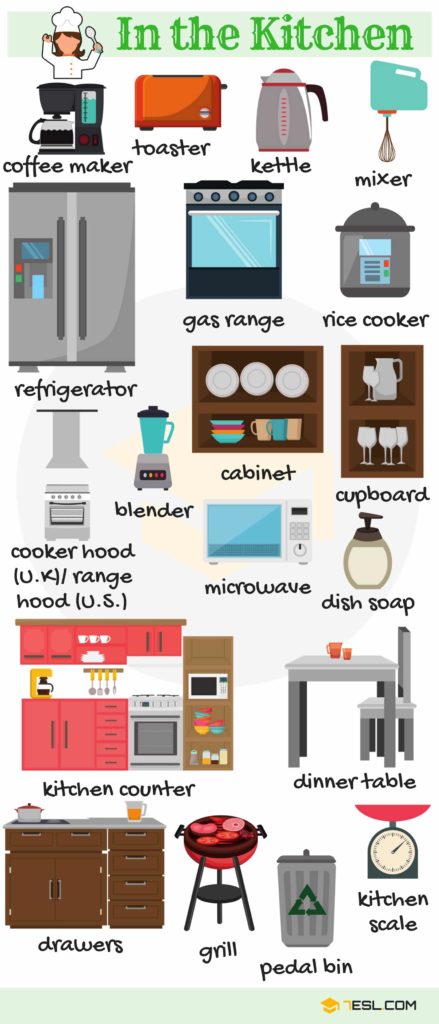
WEEK 1: Christmas vocabulary + True/false quiz.
Grammar: Talking about plans using BE + V-ing.
Homework: what are you doing for the holidays?
WEEK 2: “All I want for Christmas is you” gap fill. Talk about projects: Christmas songs and advent calendar.
WEEK2 : Talk about holiday traditions.
BE + V-ing for plans vs for present actions.
Christmas songs vs Christmas carols.
Choice of song or carol:
« Happy Xmas War is over » by John Lennon; « Twelve Days of Christmas »; « All I want for Christmas is you »
Homework: What are your plans for this holiday season? Use BE + V-ing.
Suggest a Christmas song or carol to listen to next week.
More resources:
Christmas songs, lyrics and exercises :
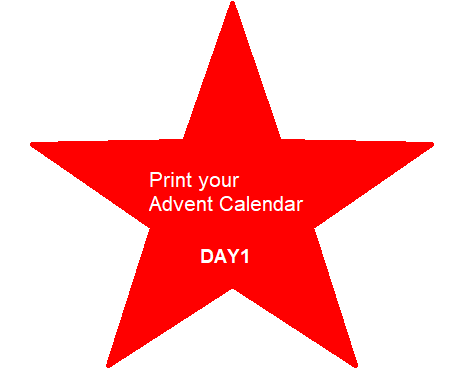
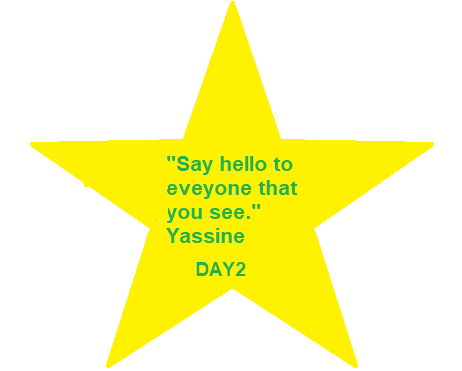
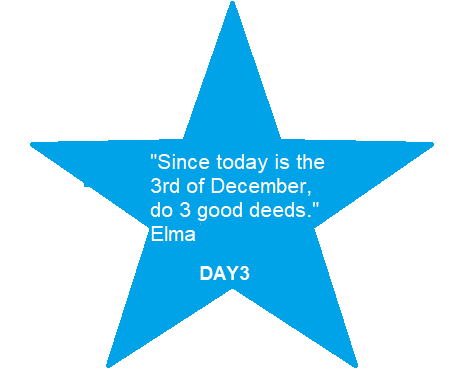
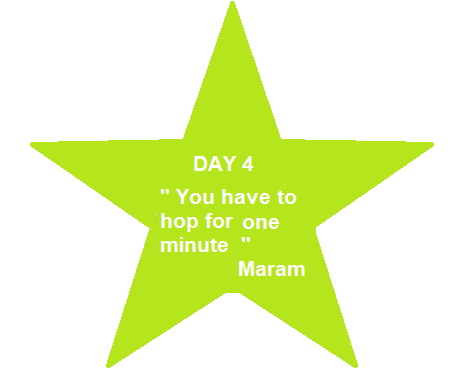
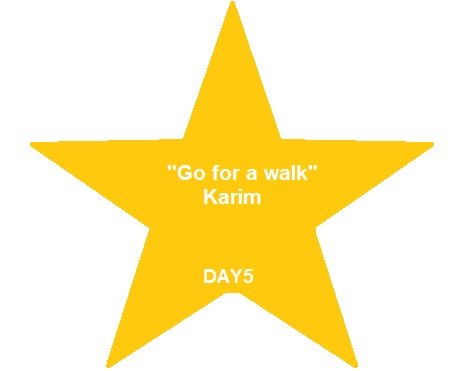
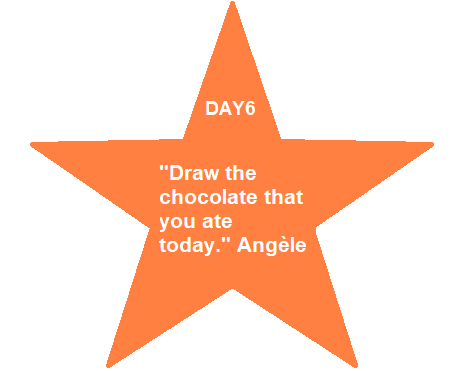
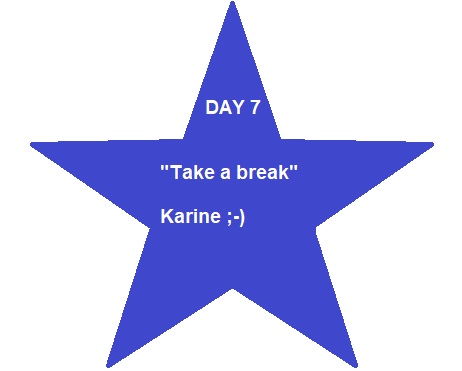
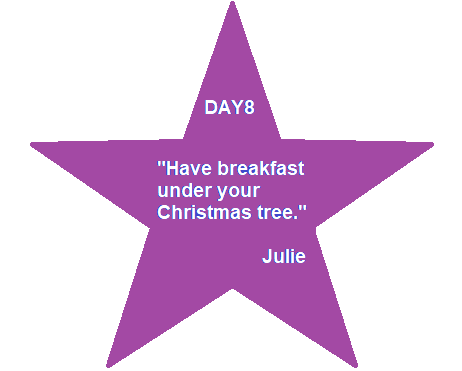
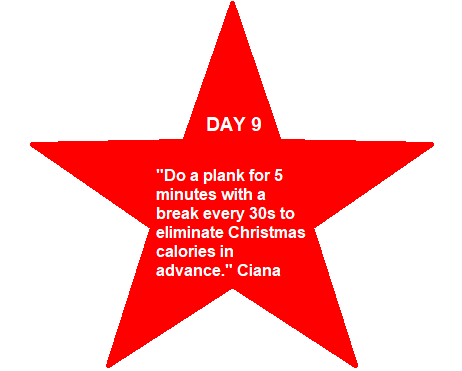
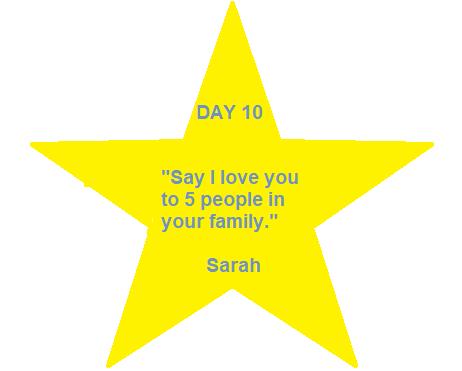
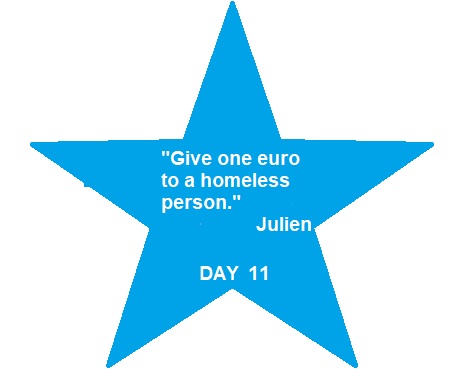
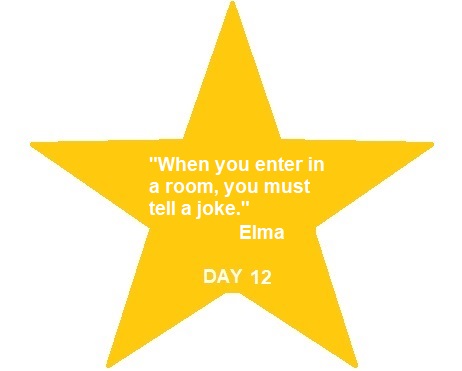
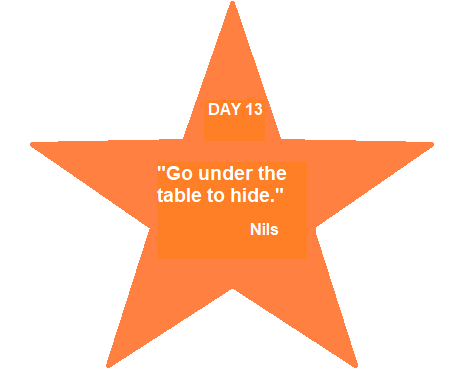
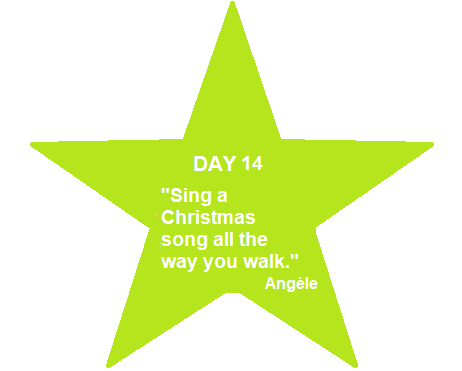
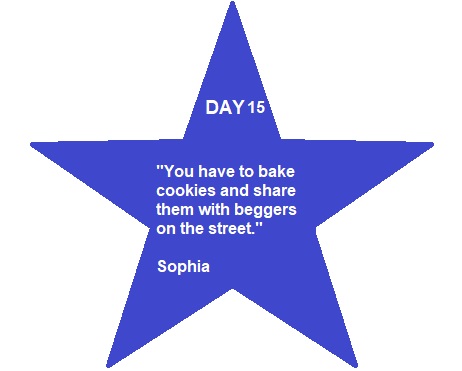
You can find some English and American recipes here :
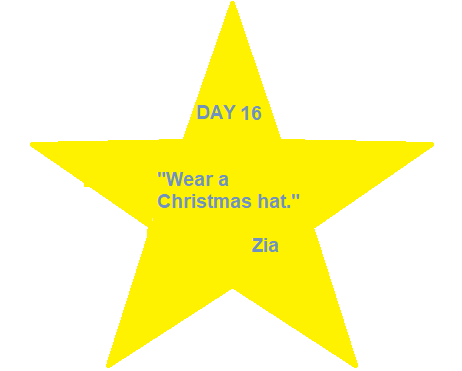
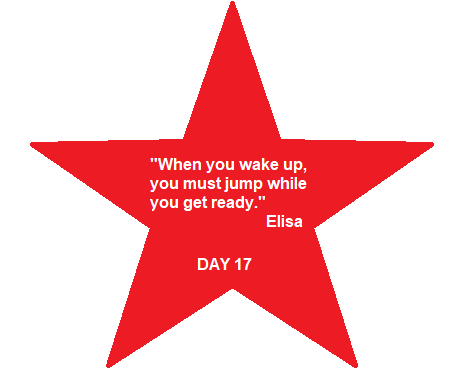
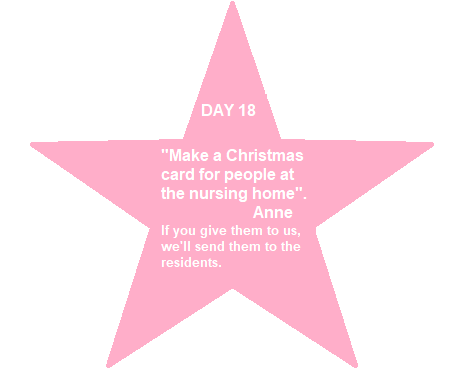
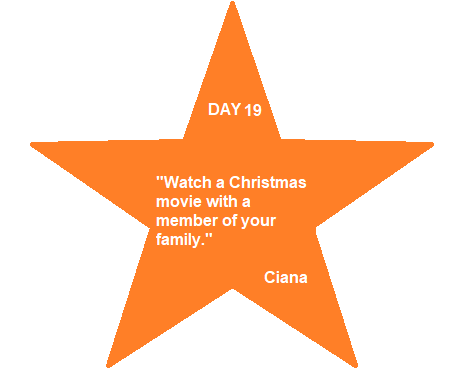
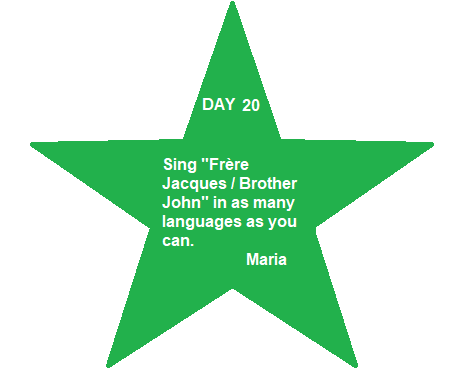
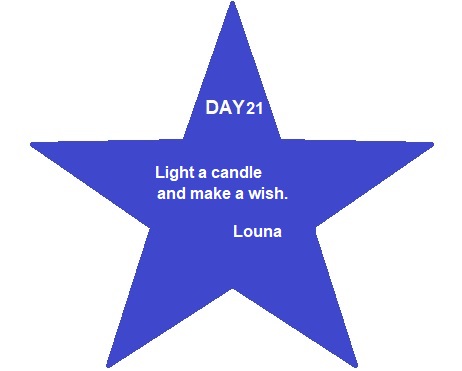
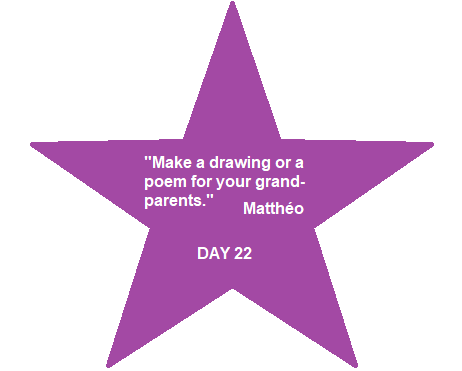
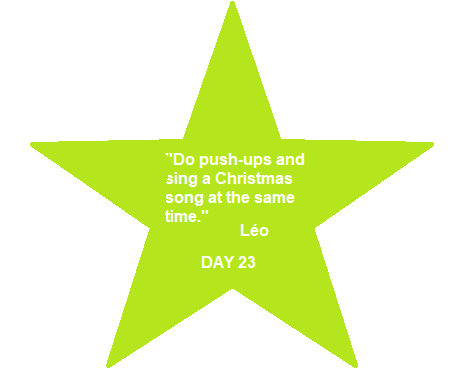
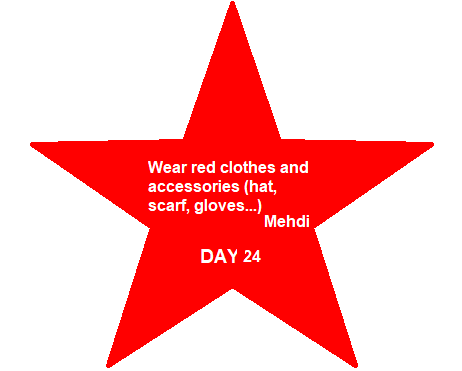

Created during By The Way 2020 Teens classes – starter on Tuesday, April the 21st
Last update : Tuesday, May 12th at 8pm
The plot :
In the group, there is a form of inequality which causes a dispute because their music is not compatible. Caroline and Kelly like playing one type of music, while Sandrine and Alexa have a different idea. Lucy is alone, stuck in the middle. She is concerned about the dispute and does not feel comfortable to say what she thinks.
There is another student (or teacher) at the school who exacerbates this conflict within the group. They want to break up the group but, in the end, the girls realise that they are stronger together.
Characters:
Caroline: She plays piano. She likes classical music. She is a little shy and very happy. She’s an optimist. She has black hair and brown eyes. She is Korean. She is medium height.
Kelly: She plays guitar. She likes pop music. She is very patient and honest. She always says what she thinks. She has red hair and green eyes. She has white skin and she is tall.
Sandrine: She plays drums. She likes rock ‘n roll! She is impatient and hyperactive. She has lots of energy. She has purple hair and blue eyes. She has white skin and she is short.
Lucy: She plays flute. She is intelligent, shy and often sad. She has blond hair and blue eyes. She has white skin and she is tall.
Alexa: She plays electric guitar. She likes rap. She is outgoing. She has black hair and blue eyes. She has brown skin and is tall and skinny.
Ben: The student who exacerbates the conflict. He is a singer. He is irritable and curious.
The story :
This story is about five girls who study at Gallagher Elite High School of Music in London. Gallagher is unlike other schools in the region. The Principal rules very strictly and always ensures that the uniform looks perfect.
The girls are in a school music class. They are playing different styles of music.
Caroline : « Kelly, your music is very nice. I think our music goes well together. »
Kelly : « Thank you, your music isn’t bad either. Let’s try to play together if you want? »
They play a pop song together on piano and guitar.
Sandrine hearing the music : « I don’t really like the sound of your music, girls. »
Alexa : « I agree with Sandrine. It’s terrible! »
In the meanwhile, Lucy is alone. Ben goes over to her, and suggests they start a group of their own. Alexa and Sandrine see Lucy with Ben and ask her: “Why have you abandoned us?”
Lucy says to the girls: “I have left you because you ignored me, did your own thing and left me alone for so long.”
Caroline and Kelly join, intrigued, “What’s happened?” “What is it?”
Ben responds, defensively, “Stop, leave us alone.”